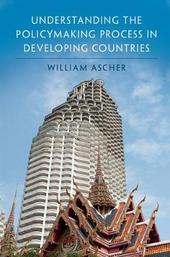
|
Understanding the Policymaking Process in Developing Countries
Hardback
Main Details
| Title |
Understanding the Policymaking Process in Developing Countries
|
| Authors and Contributors |
By (author) William Ascher
|
| Physical Properties |
| Format:Hardback | | Pages:252 | | Dimensions(mm): Height 236,Width 157 |
|
| Category/Genre | Development economics
Political economy |
|---|
| ISBN/Barcode |
9781108417617
|
| Classifications | Dewey:320.6091724 |
|---|
| Audience | | Professional & Vocational | | Undergraduate | | Postgraduate, Research & Scholarly | |
|---|
| Illustrations |
Worked examples or Exercises; 10 Tables, black and white
|
|
Publishing Details |
| Publisher |
Cambridge University Press
|
| Imprint |
Cambridge University Press
|
| Publication Date |
16 November 2017 |
| Publication Country |
United Kingdom
|
Description
Understanding the Policymaking Process in Developing Countries provides a uniquely comprehensive and practical framework for development practitioners, policymakers, activists, and students to diagnose and improve policy processes in developing countries across a wide range of issues. Based on the classic policy sciences approach, the book offers over 100 diagnostic indicators keyed to identify problems of policy processes, policy content, bureaucratic behavior, stakeholder behavior, and national-subnational interactions. This multi-disciplinary framework is applied to a host of policy problems that particularly plague countries experiencing the 'under-development syndrome', including aborted programs and projects, policy impasses, distorted implementation, unnecessary harm and conflict, and shortsighted initiatives. These points are illustrated through cases from Africa, Asia, and Latin America. Based on the developing countries' distinctive challenges, the book also offers recommendations on improving policy content and institutions to address the typical limitations.
Author Biography
William Ascher is Professor of Government and Economics at Claremont McKenna College, California. He has authored or edited nineteen books on political economy of development, natural resource and environmental policy, political psychology, forecasting methodology, physical infrastructure policy and conflict-sensitive development. Ascher has twice won the Harold D. Lasswell Prize for best article in Policy Sciences and his book Bringing in the Future (2009) won the International Political Science Association's Levine Prize for the best public policy book of 2009. He has worked with the World Bank, USAID, the EPA, directed the Duke Center for International Development, and served as Dean of the Faculty at Claremont McKenna College.
Reviews'This is an excellent book. It is an important step forward in global development scholarship because it combines a highly effective 'reality check' on development theory and practice and it offers accessible practical steps and intelligent advice on how to unpack and overcome persistent challenges to development work. It should be required reading for aspirant development practitioners and policymakers.' Craig Hammer, Program Manager, The World Bank 'It is rare to encounter a generalized explanation of the policymaking process in developing countries that doubles as a practical guide for the policy analyst. Understanding the Policymaking Process in Developing Countries is one such contribution. Ascher's structured and thorough explication of the policy process in developing countries, including the social, political, and institutional dimensions, is especially valuable for the practicing policy scientist.' Matthew Auer, Dean of the School of Public and International Affairs, University of Georgia 'This timely book by an experienced development thinker helps remind us that good development policies and programs require more than careful analysis. Effective policymaking also requires that those charged with implementing policies and programs be willing and able to ask the right questions about how the policy process works. This book provides valuable advice both on how policymakers and their advisors should pose these questions as well as on how they should might get them answered most effectively.' Sudhir Shetty, Chief Economist, East Asia Pacific, The World Bank
|